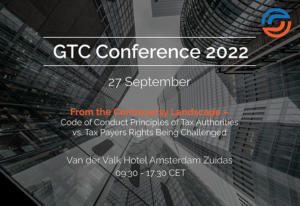In her recent blog, Allison Christians usefully alerts us to some of the challenges and opportunities of the new rules on international taxation being negotiated at the OECD. However, it is important to shed some additional light on the dynamics and context of the Inclusive Frameworkprocess.
The acute tensions we see in the international tax system have indeed come to a head through Europe’s claim for more tax from the US digital companies. However, this ‘great powers’ dynamic among states, as Allison Christians characterises it, is only a small part of a far more complex picture with new alliances at play and in a constant state of flux. The new tax rules are of course being addressed within a legacy—both a legacy of tax rules inspired at the creation of the League of Nations 100 years ago and the legacy of post second word war institutions set up by the ‘great powers’. The attempt to set new global rules requires a move away from these constraints and to address the asymmetries inherent in international negotiations. The process is being played out against the background of an acceleration in treaty-circumventing unilateral measures which seek to impose taxes on gross income flows, creating a sense of urgency across the world.
In her recent blog, Allison Christians usefully alerts us to some of the challenges and opportunities of the new rules on international taxation being negotiated at the OECD. However, it is important to shed some additional light on the dynamics and context of the Inclusive Framework process.
The acute tensions we see in the international tax system have indeed come to a head through Europe’s claim for more tax from the US digital companies. However, this ‘great powers’ dynamic among states, as Allison Christians characterises it, is only a small part of a far more complex picture with new alliances at play and in a constant state of flux. The new tax rules are of course being addressed within a legacy—both a legacy of tax rules inspired at the creation of the League of Nations 100 years ago and the legacy of post second word war institutions set up by the ‘great powers’. The attempt to set new global rules requires a move away from these constraints and to address the asymmetries inherent in international negotiations. The process is being played out against the background of an acceleration in treaty-circumventing unilateral measures which seek to impose taxes on gross income flows, creating a sense of urgency across the world.
The 135 countries in the Inclusive Framework are working together on the new rules in a participatory way. Importantly, they are guided by a strong group of leading countries (a steering group). This group comprises 24 countries from the OECD, G20, and developing countries including in Africa from Ivory Coast, Nigeria, Senegal and South Africa. In this body, ‘the great powers’ include China (vice chair) and India. The dynamics of negotiations here can be counter-intuitive: on some issues, market jurisdictions in Africa may have more in common with the US than the Europeans do with the US or China.
To reach consensus, country delegates negotiate as sovereignties, not in blocks. This may explain why some senior officials from the G24 have distanced themselves from the block view submissions, seeing the dangers of a block mentality damaging the chances of consensus and because of the varied interests of countries in established groupings. Within the G24 grouping, the common ground between low-income countries and advanced middle-income powers, for example, may not help provide useful grounds for compromise or consensus. In the same way, there is no single OECD and no single European view. The closest to a regional view has been set out for many African countries by ATAF. See ATAF’s constructive response to the OECD effort here.
The OECD’s work is informed by increasingly diverse staffing. Contrary to Allison Christians’ speculative suggestion, we have many non-OECD nationals in our OECD Secretariat team: Brazilian, Cameroonian, Chinese, Colombian, Costa Rican, Egyptian, Indian, Kenyan and Pakistani to name a few, the result of a derogation to the usual OECD rules granted to staff of the Centre for Tax Policy and Administration to bolster inclusion.
Where we take greatest exception is Christians’ statement that the OECD Secretariat’s intention is to restrict discussion. This is the opposite of what is the reality and it is noticeable no basis for this statement is offered. The Secretariat’s role is not to propose solutions that favour one group or another but rather to explore a potential consensus solution that will appeal to states, with the inevitable compromises such a process necessitates. This has involved extensive discussions at many different levels. The process rests not on restricting discussion but on an expansive approach to discussion. The unified approach is the result of finding the common ground between diverse ideas (from all states), interests and positions relating to user contributions, marketing intangibles and significant economic presence. If we succeed in finding a consensus-based solution, commentators will no doubt claim that the result is evolutionary and incremental. Fair enough, but the much-hoped for inclusion of a formulaic approach to taxing rights, a fixed return approach for some functions, and taxing the multinational enterprise group as a whole, are all points that could not have realistically been envisaged even five years ago. Yet, as I write, these elements are now on the table as a realistic part of the proposed package and are welcomed by some of the poorest countries. Suggestions that there is no radical departure from the current rules on international taxation are therefore very wide of the mark.
Our committee negotiations can be painful—135 countries effectively playing three dimensional chess—and at times we seem far removed from the realities of tax administration in hard-pressed countries where revenues are tight. There may be a gap as well between those on the outside, and the views and interests of others they claim to represent, and what countries are actually trying to negotiate in the real world.
The acute tensions we see in the international tax system have indeed come to a head through Europe’s claim for more tax from the US digital companies. However, this ‘great powers’ dynamic among states, as Allison Christians characterises it, is only a small part of a far more complex picture with new alliances at play and in a constant state of flux. The new tax rules are of course being addressed within a legacy—both a legacy of tax rules inspired at the creation of the League of Nations 100 years ago and the legacy of post second word war institutions set up by the ‘great powers’. The attempt to set new global rules requires a move away from these constraints and to address the asymmetries inherent in international negotiations. The process is being played out against the background of an acceleration in treaty-circumventing unilateral measures which seek to impose taxes on gross income flows, creating a sense of urgency across the world.





